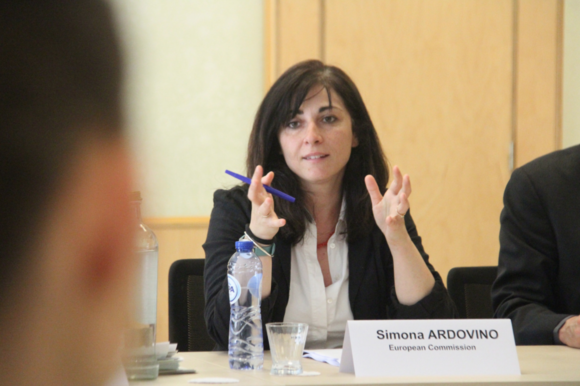The COMECE Working Group on Migration and Asylum examined the status quo of the negotiations concerning the Dublin Regulation recast, that should be adopted by the Council at the end of June 2018. The event was held last week and gathered experts from Bishops’ conferences, representatives of Catholic organizations and EU and UN officials.

European Commission representative Simona Ardovino during the meeting of the Working Group. (Credit: COMECE)
Participants also discussed the criminalisation of the humanitarian assistance to irregular migrants and the state of play of the negotiations related to the UN Global Compacts on Migration and Refugees.
COMECE sustains a more active role of the EU and its Member States in strengthening the efforts to overcome the root causes of forced migration by promoting the rule of law, the protection of the fundamental rights of the citizens, peace structures and stability, as well as more ambitious investments in the countries of origin and transit.
The Dublin Regulation recast will determine States responsible for the asylum applications and the relocation of refugees through a distribution mechanism. Disagreements among EU Member States include the mandatory nature of the mechanism and the number of years the refugee should remain in the responsible country.
During the COMECE Working Group meeting, participants highlighted the challenges faced by local authorities in implementing the legal obligation foreseen by the EU legislation criminalising the facilitation of unauthorised entry, transit and residence of irregular migrants. In some EU Member States an atmosphere of intimidation discourages people from fulfilling their moral and, even in some cases, legal obligation to provide benevolent assistance to irregular migrants.
During a recent visit to COMECE, Fr. Fabio Baggio c.s., Holy See Under-Secretary for Migration and Refugees, stated that the UN Global Compacts on Migration and Refugees, although they are not binding instruments, could reinforce the framework for an international management of migratory influxes and to better protect asylum seekers, on the basis of a human rights approach that puts the person at the centre of these policies.
The Migration Section of the Holy See published its “20 action points” addressing the fundamental questions that the UN Global Compacts should include.
Media
Photo Gallery
